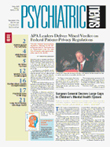Serious concerns regarding pharmaceuticals and their side effects have flooded recent news, leaving doubts about the safety of approved medications. Drug dangers originate upon approval and escalate through prescribing practices. The FDA has been criticized for rushing through the drug approval process. In fact, 11 drugs have been withdrawn due to life-threatening side effects since 1997.
Psychiatry is not immune. Depakote (divalproex sodium) now carries boxed warnings for liver failure and pancreatitis and has been associated with fatalities. Mellaril (thioridazine) and Serentil (mesoridazine besylate) have been restricted to second-line use due to QTc prolongation, which may lead to sudden death. Drug side effects are particularly perilous for patients with major psychiatric disorders, who often suffer from comorbidities, such as heart disease and hepatitis, and may be noncompliant with their prescribed dose.
Unfortunately, warning labels do not always assure that patients are safely receiving medications. Physicians sometimes fail to follow warnings on labels thoroughly. Seven recently withdrawn drugs were banned in part when doctors prescribed them against their warning labels. The Institute of Medicine has reported that up to 7,000 Americans die each year as a result of medication errors.
Reality prevents pointing fingers. It is nearly impossible for physicians to keep track of the infinite fine print and buried warnings among the multitude of prescription labels. An editorial by Raymond Woosley, M.D., Ph.D., in the December 20, 2000, Journal of the American Medical Association (JAMA), observed that the package insert for Propulsid (cisapride) contains more than 470 facts about the drug. According to Woosley, “Physicians would have difficulty mastering all of this information for even one drug, much less the 40 to 100 medications that they regularly prescribe.”
Physicians also face label fatigue when they cannot keep up with constantly changing labels. When drugs that are approved without or with mild warnings are found to be dangerous, the FDA dictates a label change. However, the first label assigned to a drug usually sticks. A study reported in the December 20, 2000, JAMA found that a boxed warning added to Propulsid’s label and a “Dear Doctor” letter alerting physicians to the drug’s association with prolonged QTc intervals failed to change Propulsid prescriptions.
The FDA has recognized that current labels are not sufficiently protecting patients and plans to revise labels on newer medications, making warnings easier to read and follow. The change is a step forward, but only if the appropriate warnings are assigned at approval, rather than after patients suffer serious adverse effects.
There is no single answer to the side-effect problem. Ideally, the FDA will more carefully analyze potential drug dangers before approval. If the drug benefits do not outweigh the risks, the drug should not be approved, particularly if safer, effective substitutes are already available. Stronger, more noticeable warnings upon approval will help—if physicians carefully follow them.
Tremendous strides have been made in the development of improved drugs. Physicians should not be afraid to prescribe medications and will not have to be—if approved drugs are as safe as possible, assigned appropriate warnings, and prescribed with care.
